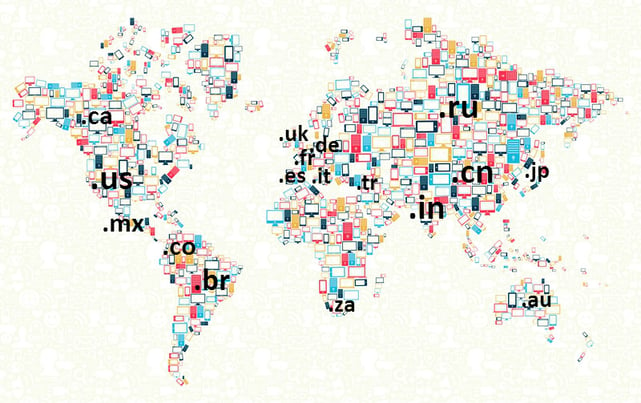The importance of owning a domain for your export markets is twofold: Firstly, to protect and own your brand, secondly to improve your local search engine optimization. In this blog, we will take a closer look at both of these aspects, give you recommendations on the increasingly popular geographical domains, and provide you with basic information on what you need to register your international domains.
Country specific domains for branding
You wouldn’t allow your competitors to use your logo above their store entrance in order to lure your customers in and to then sell their products to them. You should think of owning international domains for your export markets in the same way.
Even if you might be just dipping your toes in a new export market, one day your export market customer base might reach a similar level of penetration and recognition as your home market and your local domain would become invaluable. We’ve seen cases where local domains were registered by competitors, ex-distributors or other partners. Two main reasons why someone would register your international domains are: 1) To exploit a recognized brand in order to identify target customers and sell them competitive goods; 2) To make money – domain owners often ask for exaggerated sums of money in order to sell domains with your company’s name in your export market. It is very difficult, costly and time-consuming to buy domains from someone else. You can avoid it by registering your international domains as soon as you can. However, buying up all your possible country domain names gets expensive. Focus on your priority markets and start with these.
Country specific domains for better search engine optimization (SEO)
Search engines favor websites with URLs that include a country code (e.g. “de” for Germany, "ca" for Canada, "cn" for China or "br" for Brazil) that is identical with the search engine and geographic location from where the search was carried out. That’s why it can be difficult to get the same online visibility with your .com site in your export markets. Country specific domains like companyname.de will help you overcome that obstacle. However, there is an equally effective solution that can help you in case you can’t register a local domain. Google treats a system of subdomains (de.companyname.eu) or subdirectories (companyname.eu/de) the same as country specific domains (companyname.de). The implementation is fairly easy and does not cost you anything extra. If you have them, you can then point the country specific domain to the subdomain or subdirectory.

How useful are geographic domains like .eu, .lat or .asia?
Google currently treats regional domains as general domains and not as country specific domains, so these do not have any SEO benefit. However, they are useful to demonstrate your regional commitment. They can be used very effectively in combination with either local subdomains or subdirectories, e.g. companyname.eu/fr (France), companyname.lat/ar (Argentina) or companyname.asia/vn (Vietnam). In this way you demonstrate your commitment towards the continent (or other geographic location), but also get an advantage on local search engines.
You can also use them if you only have one site for multiple countries that speak the same language, for example .lat can be used for all Spanish speaking countries in South America and .arab can be used to target the Arabic part of the world.
What are the requirements for international domain registration?
This varies greatly across the globe. For example, there are no restrictions for registration of .in for India or .com.mx for Mexico. This applies to the majority of South American domains that use the same format .com.countrycode.
In Europe, the situation is a bit stricter. You might need a local address, local tax number, local trade registration number or a local passport number. This is governed by each country independently, even within the EU member states. Usually you can fulfill these requirements when you use a local partner for domain registration.
The restrictions can be even stricter in certain countries. For example, you need to be licensed to trade in Australia for local domain registration. Or at least you need a very close and substantial relationship with your partner in Australia, so that he could register it on your behalf.
How much does a domain registration cost?
The annual fee for domain registration ranges from a couple of dollars to hundreds of dollars, depending on the country and domain registrar you’re using. In some cases there is also a one-off set up fee.
In conclusion, you need your local domain name for brand protection, but it is not completely necessary for search engine optimization. Sometimes you might be able to register the domain yourself without limitations, sometimes you need a local partner, and in some cases you need to have an official proof of trade or be registered in your export market. The cost of domains is always lower when you register it when it’s still available at domain registrars, it gets more expensive when you try to buy it from someone who registered it first. So do your research today, we recommend to start with your existing domain registrar, they sometimes even provide support with international domain registration as well.

